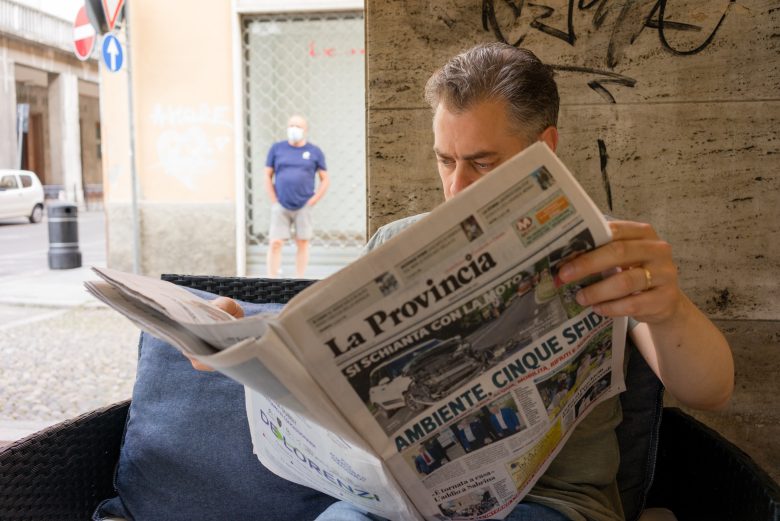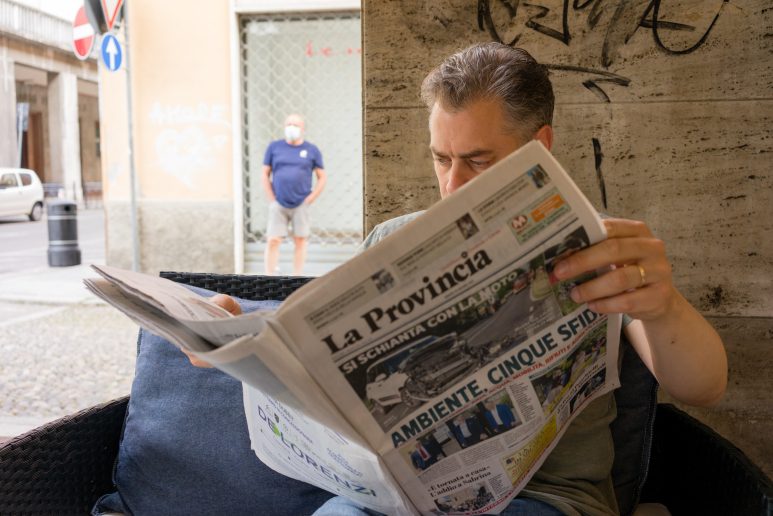By Sara Giudice
In the first episode of the Italian police TV drama Nero a Metà (Rai, 2018), the protagonist, Malik Soprani, talks with Monique, a young mother trafficked through the Mediterranean. She is about to return to her daughter. The woman apologises for her difficult behaviour, thanking Malik for his help in finding freedom again. He apologises back, saying he should be the last to act upon prejudice towards Black people. Then, they talk about their relationship with Africa through the concept of “home”. Malik, just like Monique, is a person of African descent and has to deal with his identity, his job in the Roman Police force and his past.

Both Malik and Monique have a deeply traumatic past, marked by a dangerous journey from the very north of the African continent to the very south of Italy. Malik, for example, deals with raging PTSD flashbacks of his mother’s death during a shipwreck in the Mediterranean Sea. But he is not the only one; Gabriel Kidane in Doc (Rai, 2020) is a young doctor in Milan and an Italian of African descent, trafficked to Italy as a child; in Questo è il mio paese (Rai, 2015), Said has come to Calura, in the region of Calabria, to pick oranges in poor, irregular working conditions and he, too, has arrived in Italy through the Mediterranean. A “reverse” example could be the Italian comedy movie Tolo Tolo (C. Zalone, 2020), in which a debt-ridden white Italian man flees to Kenya and is forced to return to Italy through the Mediterranean when a civil war breaks out.
The Mediterranean route can be considered a fairly common trope in Italian cinema and television, bordering on stereotype. In this trope, the character of African descent is not necessarily put onto the screen with a stereotyping intent but is surely limited in its growth because of his traumatic past. By the rule of Western narrative standards, the character must overcome their emotional or practical deficit to achieve fullness, but characters of African descent in Italy can only overcome the trauma of their migration, which means that their paths towards fullness and personal improvement are limited to their capacity to suffer for the white audience. This way of achieving a new fictional balance could be easily disregarded as a detail of little to no importance, but what shouldn’t be ignored is the real-life corresponding events.
Giulia Vicari, immigration lawyer in Palermo, Sicily, tells MDI that the real-life Mediterranean route isn’t the only journey that the migrating population of African descent faces: “I always say that after the journey on the boat, or through the desert, begins a new one: the regularisation process, which is extremely difficult. It takes years! And in this period, the immigrant feels frustrated and incapable of doing anything.” Vicari also describes a change in pace, regarding the integration of the migrant population in Italy. After the Cutro law of 2023, which sparked protests in April the same year, the so-called “special protection” has been greatly reduced, meaning that achieving a green card (residence permit) is now even more daunting. Vicari adds: “Without a residence permit, many other rights drop-down, such as the right to work, the right to residence documentation, the right to a family doctor and a healthcare card,” a series of things that can only be obtained in Italy with either Italian citizenship or a green card. Such a situation can only worsen the quality of life of people that come through the Mediterranean route. Their road to fullness is interrupted by Italian bureaucracy, institutionalised racism and everlasting gangrenous cultural habits.
The gap between the fictional stories (on the screen) and the real-world (outside of it) is, thus, embarrassingly clear.
This particular problem was also highlighted by Balkissa Souley Maiga during the first Roman screening of The Moor (Il Moro), a short movie by Daphne Di Cinto about the Florentine duke of African descent, Alessandro de’ Medici. Maiga, who plays Alessandro de Medici’s mother in the movie, talked at length about the sense of alienation that comes from Italian cinema, which struggles to tell stories rooted in reality. Both as an actress and a spectator, Maiga said that, on the screen that she often inhabits, she still cannot see the tangible, multicultural Italy that lives outside. But The Moor itself is a great example of how some Black authors are making new space for Black-led Italian stories. By choosing to tell Alessandro de’ Medici’s struggle for recognition and final success over his white antagonist, Ippolito de’ Medici, Di Cinto creates a counter-space that is, truly, only oppositional because of the constant stereotyping of people of African descent that comes from mainstream media. As made clear by interventions of the audience after the screening, the history of Italians of African descent lives as a counter-narrative because of the Western practice of exclusion.
But what does it mean to be a Black author in Italy? When asked about it, Ariam Tekle, documentary filmmaker and podcaster, was quick to say that one positive example in a pool of perpetrators doesn’t suffice, because to be included in mainstream spaces means to accept one fundamental compromise: to be tolerated. For Tekle, it’s important to reclaim one’s achievement but it’s equally fundamental to recognise what a successful author of African descent leaves behind, which is a plethora of unsuccessful others. Tekle tells MDI it is also crucial to recognise the way in which individual Black authors are often “included” only if they can bring the weight of an entire community, which they rarely can represent in an exhaustive way, with no room for mistakes or even failure.
In conclusion, there isn’t one formula to solve the whole issue. Differently from what is often stated by White, already established authors, “including” isn’t enough to solve the everlasting practice of exclusion of non-White TV and cinema workers. There must be a change in authoriality, that is to say a change in narrative, productive and formative practices. Those changes can not only reduce the gap between mainstream media and the reality of Italians of African descent, but also give true agency to those who can disrupt the class barrier and finally gain access to the means of production, both economically and creatively.

